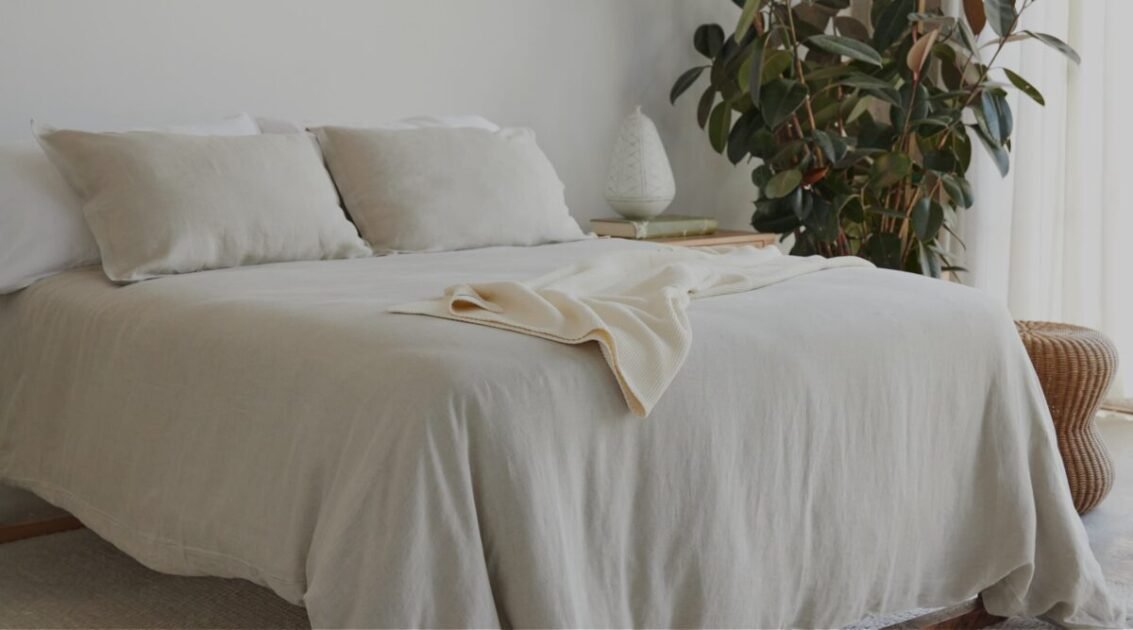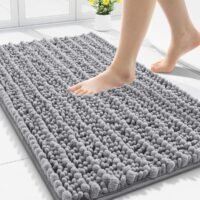Choose materials such as organic cotton, linen, silk, hemp, or bamboo for the healthiest and most natural bedding options. These fibres are sustainable, absorb moisture well, and regulate temperature, ensuring a comfortable and restful sleep.
Look for bedding that is produced using safe practices, with natural dyes, and without harsh chemicals. Organic bedding is worth considering as it is grown without toxic pesticides and cleaned with natural, vegetable-based soap instead of harmful cleaning products. Avoid bedding treated with formaldehyde, often indicated by the label ‘Permanent Press’.
You can create a healthier and more sustainable sleeping environment by prioritizing natural and non-toxic materials.

Benefits Of Natural Bedding
Discover the numerous benefits of natural bedding, including improved sleep quality, reduced exposure to toxins and allergens, and eco-friendly production methods. Experience the comfort and peace of mind of choosing bedding made from organic cotton, silk, hemp, bamboo, or linen.
Improved Sleep Quality
One of the significant benefits of natural bedding is improved sleep quality.
When you choose a bed made from natural fibres such as organic cotton, silk, hemp, bamboo, or linen, you make an intelligent choice for your sleep environment. These sustainable materials have excellent moisture absorption properties, allowing them to regulate temperatures and keep you comfortable throughout the night.
This means you can say goodbye to tossing and turning and wake up refreshed and well-rested. You can finally experience the deep, uninterrupted sleep you’ve been dreaming of with natural bedding.
Reduced Exposure To Toxins
Another compelling reason to switch to natural bedding is the reduced exposure to toxins.
Conventional bedding products are often treated with harmful chemicals such as formaldehyde, flame retardants, and pesticides. These chemicals can off-gas into the air and come into contact with your skin while you sleep, contributing to long-term health issues.
By opting for natural bedding made from organic materials, you can have peace of mind knowing that you are reducing your exposure to these harmful toxins. Organic bedding is free from pesticides, synthetic fertilizers, and genetically modified seeds, ensuring a safe and healthy sleep environment.
Environmentally Friendly
Choosing natural bedding is not only beneficial for your health but also for the planet.
Traditional bedding materials, such as synthetic fibres and conventional cotton, contribute to environmental degradation through their production processes. The use of toxic chemicals, excessive water consumption, and high carbon emissions all take a toll on the environment.
On the other hand, natural bedding is made from sustainable materials and produced using eco-friendly practices. Organic cotton, for example, is grown without toxic pesticides and synthetic fertilizers, resulting in a lower carbon footprint. Linen, another famous natural bedding material, requires less water and produces less waste than other fabrics.
By choosing natural bedding, you are positively impacting the environment, minimizing your carbon footprint, and contributing to a more sustainable future.
Top Natural Fabrics For Bedding
When choosing bedding that is not only comfortable but also environmentally friendly, natural fabrics are the way to go. These fabrics are made from renewable resources and have minimal environmental impact. In this section, we will look at three top natural fabrics for bedding: organic cotton, organic linen, and silk.
Organic Cotton
Organic cotton is grown without toxic pesticides, synthetic fertilizers, or genetically modified seeds. This ensures that your bedding is free from harmful chemicals and safe for you and the environment. It is known for its softness, breathability, and durability, making it an excellent choice for a good night’s sleep.
Organic-Linen
Organic linen is made from the flax plant, a fast-growing crop that requires little water and produces little waste. It is cultivated without synthetic fertilizers or pesticides, making it a sustainable choice for bedding. Linen is highly absorbent and has natural temperature-regulating properties, keeping you cool in the summer and warm in the winter.
Silk
Silk is a luxurious and natural fabric used for bedding for centuries. It is made from the fibres produced by silkworms and is known for its smooth and soft texture. Silk is hypoallergenic, making it an excellent choice for those with allergies or sensitive skin. It is also highly breathable and helps regulate body temperature, keeping you comfortable throughout the night.
Regarding natural fabrics for bedding, organic cotton, organic linen, and silk are top choices. They provide comfort and contribute to a healthier and more sustainable sleep environment. Consider these fabrics when selecting bedding for your home, and rest easy knowing that you are making a conscious and eco-friendly choice.
Choosing Organic Bedding
When choosing bedding, opting for organic options can have several benefits for your health and the environment. Organic bedding is made from natural fibres grown without toxic pesticides, synthetic fertilizers, or genetically modified seeds. This section will explore the various factors to consider when choosing organic bedding.
Safe Production Practices
One of the most important aspects to consider when choosing organic bedding is the production practices used. Look for sheets dyed with natural dyes rather than harsh chemicals. This ensures no harmful toxins are absorbed through your skin while you sleep. Organic cotton sheets are also cleaned using vegetable-based soap instead of toxic cleaning products. These safe production practices benefit your health and create a healthier planet.
Dye And Chemicals Used
When shopping for organic bedding, looking for products free from harmful dyes and chemicals is essential. Avoid bedding treated with formaldehyde, as it can negatively affect your health. Be cautious of labels like “Permanent Press,” which may indicate using formaldehyde to make the bedding wrinkle-free. Instead, opt for bedding made from natural fibres such as cotton (organic), silk, hemp, bamboo, or linen. These materials are excellent at absorbing moisture and regulating temperature, enhancing sleep quality.
Certifications To Look For
When purchasing organic bedding, look for specific certifications that ensure the product meets certain standards. The Global Organic Textile Standard (GOTS) is one such certification that guarantees the product’s organic integrity. GOTS-certified bedding ensures that it is made from at least 95% organic fibres, produced without harmful chemicals, and manufactured under socially responsible conditions. Another certification to look for is MADE SAFE, which assures that the product is free from harmful ingredients that could affect your health.


Frequently Asked Questions Of A Natural Bedding Guide
What Is The Healthiest Type Of Bedding?
The healthiest type of bedding is made from natural fabrics like organic cotton, silk, hemp, bamboo, or linen. These materials are sustainable, absorb moisture well, and regulate temperature, ensuring a comfortable and restful sleep. Look for bedding that is produced without toxic chemicals and fertilizers.
What Is The Healthiest Material For Sleeping?
The healthiest material for sleeping is bedding made from natural fibres like organic cotton, silk, hemp, bamboo, or linen. These sustainable materials absorb moisture and regulate temperature for a comfortable and restful night’s sleep.
What Should I Look for in Organic Bedding?
Look for organic bedding from natural fibres like cotton, silk, hemp, bamboo, or linen. Ensure it is free from toxic pesticides, fertilizers, and genetically modified seeds. Check if it is dyed with natural dyes and processed without harsh chemicals.
Look for organic cotton cleaned with vegetable-based soap. Consider sustainable materials that absorb moisture and regulate temperature for a comfortable sleep.
How Do You Know If Sheets Have Formaldehyde?
To determine if sheets have formaldehyde, look for the label ‘Permanent Press’, which may indicate using formaldehyde for wrinkle-free properties. You can also opt for organic materials like organic cotton or bamboo bedding, but be cautious as not all “organic” labels guarantee the absence of formaldehyde or other chemicals.
Conclusion
Choosing natural bedding is a smart choice for your health and the environment. Materials like organic cotton, silk, hemp, bamboo, and linen are excellent at absorbing moisture and regulating temperature, ensuring a comfortable and restful sleep. Look for sheets dyed with natural dyes and not processed with harsh chemicals.
Investing in organic bedding is worth it for safer and more sustainable sleep. So, switch to natural bedding and enjoy a healthier, more eco-friendly sleeping experience.

Hi, I’m Esrat, and I’m so glad that you found me here at Happy Food Kitchen! I started Happy Food Kitchen in 2023 to have a creative, right-brained outlet to balance my very left-brained career in genetics.




